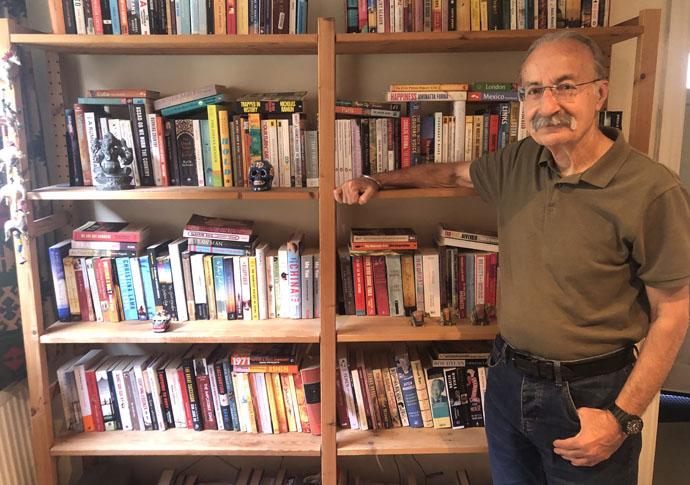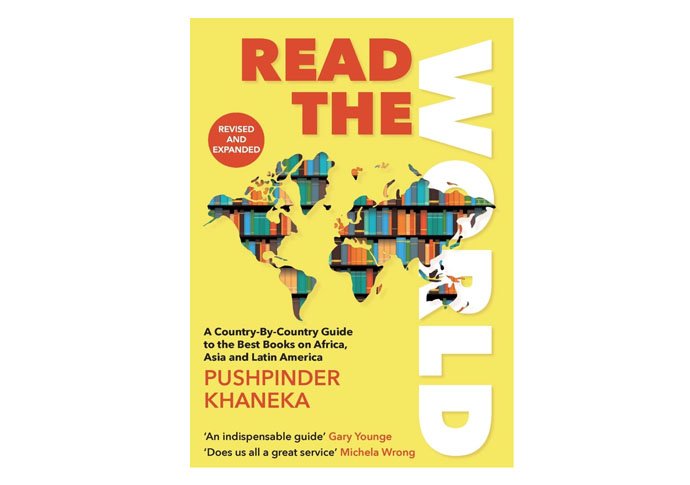‘I’m looking for books that capture a nation’s spirit and reveal something of its soul’
Have you ever wondered what books best reflect various countries? Fear not, says Dan Carrier, as he talks to a much-travelled and well-read guide
Friday, 29th August 2025 — By Dan Carrier

Author Pushpinder Khaneka
WARNING: reading this book could set your bank account back a few quid, and require some DIY to build new bookshelves.
In return, what you lose in cash you’ll gain in cerebral wealth – because this unique guide to some of the greatest books ever committed to paper is a tantalising and informative feast for the bookworm.
In Read The World, author Pushpinder Khaneka embarks on a journey through 55 countries in the global south and scours their libraries to select three titles that will cast light on the country it originates from.
As the Kentish Town-based author told Review: “The book is both a road map and a reader’s ticket to great literature, aimed at armchair travellers as well as curious explorers.”
From Asia through Africa and on to South America, Pushpinder does not ignore some of the books already well known to a UK readership – Midnight’s Children by Salman Rushdie, for example, makes up one of the trio for India and Isabel Allende’s The House of the Spirits for Chile – but he also introduces stand-out bestsellers that have stood the test of time but have not featured on “must-read” tables in London book stores.
“The book’s gestation was the idea of marrying up my favourite things: travel, being a current events junkie– though am trying to wean myself off – and an avid reader,” he explains.
The author first developed the idea while working for The Guardian newspaper on their global development desk.
“It has articles on the global south,” he says.
“I chose books for around 25 countries in a regular feature on the Guardian’s website and later added another 30 countries to publish the whole thing as a book. I also updated and added to the book list.”
For each of the 55 countries he has chosen to feature, Pushpinder has selected two works of fiction and one non-fiction book.
“The novels are mostly historical fiction or state of the nation, which tell us about the country,” he says.
“I’ve tried to use native authors. I’ve chosen across continents, eras and literary styles, offering a gateway into global cultures.”

It also comes from personal experience, and how helpful he has found books originating from the country he is visiting to shed light on a society where he is a visitor.
“I’ve travelled a lot and worked as a journalist abroad, so I have a great deal of interest in getting to know countries and digging under the surface,” he adds.
“I’m looking for books not just set on location, but ones that capture a nation’s spirit and reveal something of its soul.”
And by delving into a country’s literature, you can learn so much, he adds.
“I hope intrepid travellers who wish to experience a country rather than just visit it and armchair adventurers who want to globe trot while sitting at home will appreciate Read The World,” he writes.
The extraordinary range reveals the universality of themes – individual stories that reflect wider issues, or act as a conduit to consider an era, a political situation or the atmosphere of a time and place.
He offers five books on Palestine and Israel – with one shared non-fiction title for both, the late Guardian journalist Ian Black’s Enemies and Neighbours: Arabs and Jews in Palestine and Israel, 1917 to 2017.
One Palestinian work selected is Mornings in Jenin by Susan Abulhawa, described as “heartwrenching, haunting and highly readable,” it tells a story of a family driven from their village in the 1948 war and follows their lives in the decades that follow. “This is an unmistakably political novel whose luminous prose fizzes with passion and pique,” he adds.
Israeli novel To the End of the Land by David Grossman tells the story of Ora, the mother of an IDF conscript, who heads out to walk in Galilee with the idea that if she isn’t home, no soldier can knock on her door with the news that her son has been killed.
“Grossman manages to make the novel both epic (in its ambition) and intimate (in its narrative) painting an intriguing portrait of an anxious mother who reflects on her country’s insecurities,” he writes.
The post-colonial world is writ large as a recurring topic in many of the books, while landmark tragedies such as the genocide in Rwanda also feature.
Each book can help the reader see a country in a new light, adds Pushpinder.
“Reading around the world is important – learning about other places makes us more empathetic and understanding, broadens our horizons and ultimately helps to bridge the divide between ‘them’ and ‘us’ – especially so when there is a surge in right-wing populism,” he reflects.
“I generally chose bigger and ‘better known’ countries and did a lot of research and reading to find the right books to represent them. It wasn’t easy, especially in countries like India and Nigeria, to name just two, that have a number of great writers.
“Confronting the generally accepted literary canon – and books by mostly dead white folks – is more about gate-opening rather than gatekeeping.
“There are great tales from and about the global South told with vim, vigour and narrative verve by the likes of Chimamanda Ngozi Adichie, Gabriel García Márquez, Naguib Mahfouz and many others.”
The huge amount of reading required to put the edition together meant he discovered many new authors.
“Choosing ones that stand out is hard for me, especially when I’ve read close to 200 books,” he adds.
“That said, I really liked Mornings in Jenin by Susan Abulhawa, which gives voice to the tragedy of the Palestinians; Chimamanda Ngozi Adichie’s Half of a Yellow Sun, a powerful and eloquent novel about the Biafran war in Nigeria; and Mario Vargas Llosa’s The Feast of the Goat, about the Dominican Republic, is a masterpiece of historical fiction.”
• Read The World. By Pushpinder Khaneka, Southface Press, £12.99